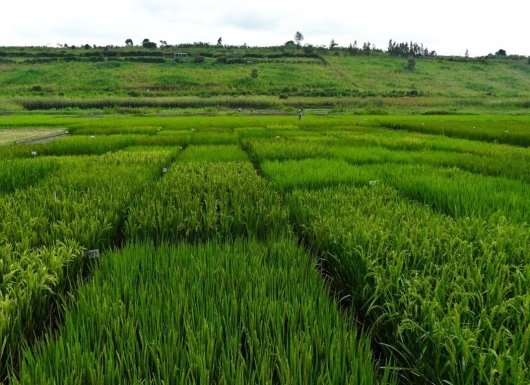Submitter: ICRISAT
High-yielding, climate-resilient rice varieties have been developed through the IRRI–NARES partnership to combat drought, salinity, and flood risks (e.g., GSR varieties). They also include Direct Seeded Rice (DSR)-suitable, low-input types, ideal for regions facing labor shortages, water stress, and poor soil fertility. Additionally, varieties with a demonstrated low Glycemic Index (GI) and high zinc content contribute to nutritional security while maintaining competitive yields. Developed using advanced breeding tools, including IRRI-derived germplasm like Sub1 and biofortified lines, these varieties support sustainable agriculture by enhancing yield stability, reducing input needs, and improving nutrition.

Value added to the seed system and farmers
These varieties are widely adapted to diverse agroecologies across India, Nepal, and Bangladesh. These include drought-prone uplands and rainfed lowlands of eastern India (Assam, Odisha, Eastern Uttar Pradesh), flood-affected plains of Nepal and Bangladesh, and saline coastal zones of Sundarbans and coastal Odisha. The low input responsive rice varieties (GSR) are suitable and scalable for medium lands in eastern India.
These climate resilient rice varieties have created a widespread impact across South Asia. Drought- and submergence-tolerant varieties have demonstrated a yield advantage of 0.4 to 0.7 tons/ha compared to conventional, widely cultivated varieties.
In India, Nepal, and Bangladesh, flood- and drought-tolerant varieties such as Swarna-Sub1, Binadhan 11, Samba Sub1, DRR Dhan 42, DRR Dhan 44, and PR 126 are being scaled up through national networks. In Nepal, varieties like Hardinath 5, Hardinath 6, Ganga Sagar 1, Ganga Sagar 2, and Sukhadhan 5 are helping farmers achieve better yields and resilience against climatic stress. In Bangladesh, submergence-tolerant varieties such as BRRI Dhan 51, BRRI Dhan 52, and Binadhan 11, along with drought-tolerant varieties like Binadhan 67 and Binadhan 71, are supporting farmers in improving yields under challenging conditions.
Additionally, nutrition-rich rice varieties—particularly those biofortified with zinc—are scale-ready and increasingly adopted in India and Bangladesh.
These varieties are well-suited to local ecologies, stress-tolerant, and aligned with market demand. Their adoption requires no additional cost to farmers. KVKs and agriculture departments can support the dissemination of these varieties through their extension networks. Additionally, state seed corporations, private seed companies, and farmer collectives can be encouraged to participate in their seed production and marketing.
Contact: Dr Swati Nayak, Scientist II - Seed Systems and Product Management, email: s.nayak@cgiar.org, Phone: +91 7381049124 Dr. Sk Mosharaf Hossain, Scientist-I, Seed System & Product Management, email id: s.hossain@cgiar.org, Phoine: +91 8018379922